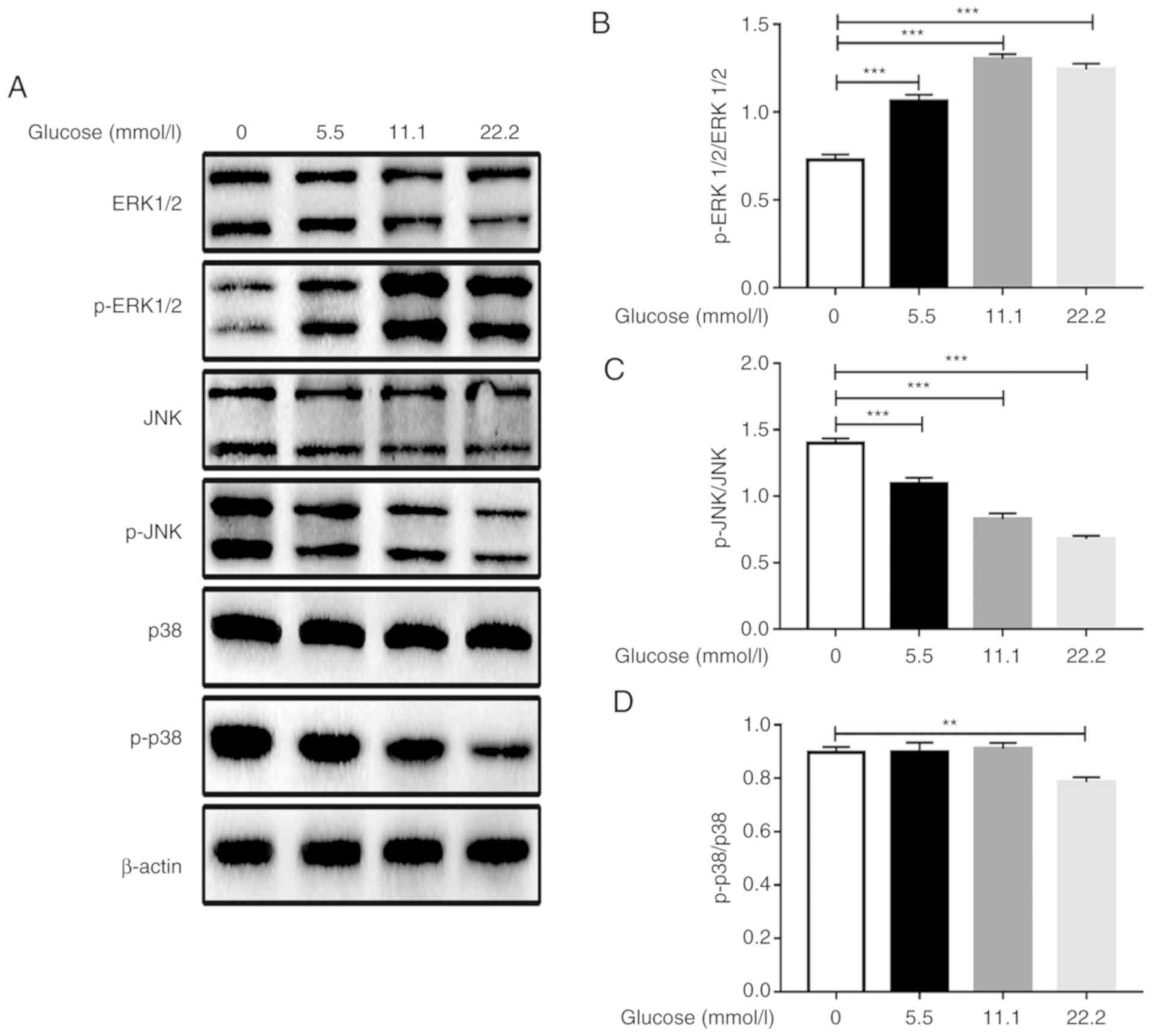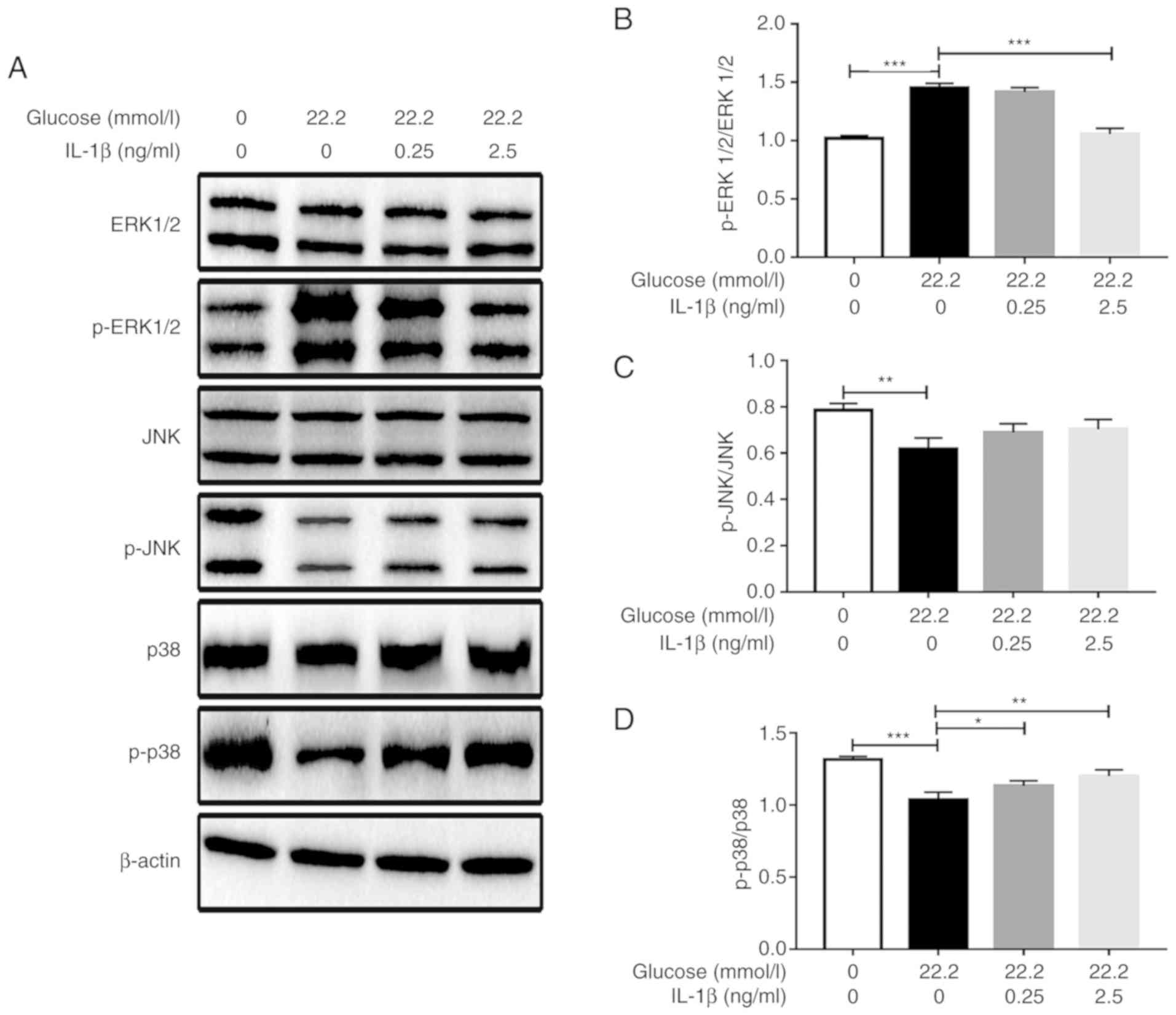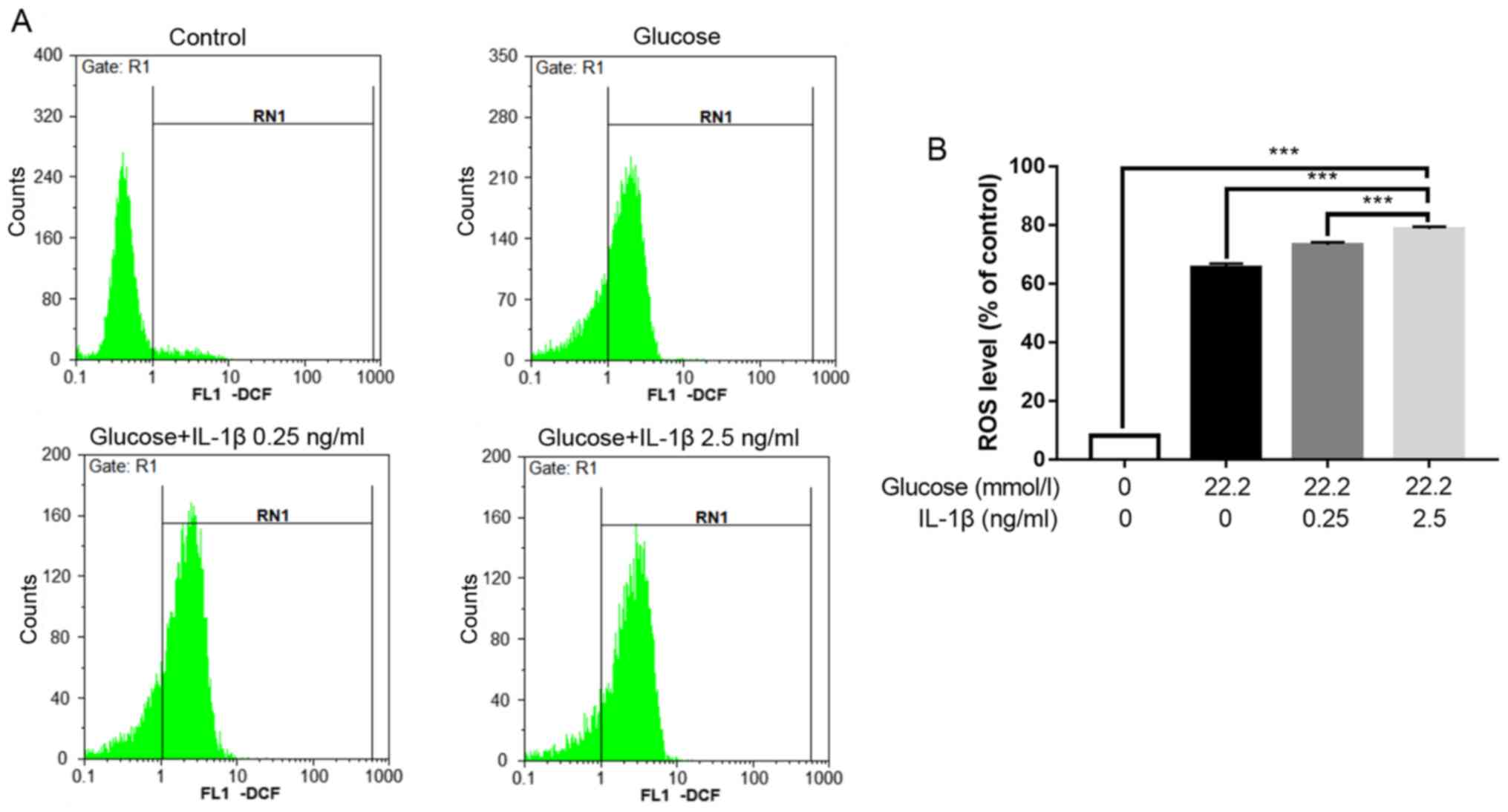|
1
|
Xu Y, Wang L, He J, Bi Y, Li M, Wang T,
Wang L, Jiang Y, Dai M, Lu J, et al 2010 China Noncommunicable
Disease Surveillance Group, : Prevalence and control of diabetes in
Chinese adults. JAMA. 310:2973–959. 2013. View Article : Google Scholar
|
|
2
|
Kim KA and Lee MS: Recent progress in
research on β-cell apoptosis by cytokines. Front Biosci.
14:657–664. 2009. View
Article : Google Scholar
|
|
3
|
Ehses JA, Ellingsgaard H, Böni-Schnetzler
M and Donath MY: Pancreatic islet inflammation in type 2 diabetes:
From alpha and β cell compensation to dysfunction. Arch Physiol
Biochem. 115:240–247. 2009. View Article : Google Scholar : PubMed/NCBI
|
|
4
|
Lambelet M, Terra LF, Fukaya M, Meyerovich
K, Labriola L, Cardozo AK and Allagnat F: Dysfunctional autophagy
following exposure to pro-inflammatory cytokines contributes to
pancreatic β-cell apoptosis. Cell Death Dis. 9:962018. View Article : Google Scholar : PubMed/NCBI
|
|
5
|
Berchtold LA, Prause M, Størling J and
Mandrup-Poulsen T: Cytokines and Pancreatic β-Cell Apoptosis. Adv
Clin Chem. 75:99–158. 2016. View Article : Google Scholar : PubMed/NCBI
|
|
6
|
Ammendrup A, Maillard A, Nielsen K,
Aabenhus Andersen N, Serup P, Dragsbaek Madsen O, Mandrup-Poulsen T
and Bonny C: The c-Jun amino-terminal kinase pathway is
preferentially activated by interleukin-1 and controls apoptosis in
differentiating pancreatic β-cells. Diabetes. 49:1468–1476. 2000.
View Article : Google Scholar : PubMed/NCBI
|
|
7
|
Kim HE, Choi SE, Lee SJ, Lee JH, Lee YJ,
Kang SS, Chun J and Kang Y: Tumour necrosis factor-alpha-induced
glucose-stimulated insulin secretion inhibition in INS-1 cells is
ascribed to a reduction of the glucose-stimulated Ca2+
influx. J Endocrinol. 198:549–560. 2008. View Article : Google Scholar : PubMed/NCBI
|
|
8
|
Størling J, Zaitsev SV, Kapelioukh IL,
Karlsen AE, Billestrup N, Berggren PO and Mandrup-Poulsen T:
Calcium has a permissive role in interleukin-1β-induced c-jun
N-terminal kinase activation in insulin-secreting cells.
Endocrinology. 146:3026–3036. 2005. View Article : Google Scholar : PubMed/NCBI
|
|
9
|
Edén D, Siegbahn A and Mokhtari D: Tissue
factor/factor VIIa signalling promotes cytokine-induced β cell
death and impairs glucose-stimulated insulin secretion from human
pancreatic islets. Diabetologia. 58:2563–2572. 2015. View Article : Google Scholar : PubMed/NCBI
|
|
10
|
Verma G, Bhatia H and Datta M: JNK1/2
regulates ER-mitochondrial Ca2+ cross-talk during
IL-1β-mediated cell death in RINm5F and human primary β-cells. Mol
Biol Cell. 24:2058–2071. 2013. View Article : Google Scholar : PubMed/NCBI
|
|
11
|
Wang Q, Zhang H, Zhao B and Fei H: IL-1β
caused pancreatic β-cells apoptosis is mediated in part by
endoplasmic reticulum stress via the induction of endoplasmic
reticulum Ca2+ release through the c-Jun N-terminal
kinase pathway. Mol Cell Biochem. 324:183–190. 2009. View Article : Google Scholar : PubMed/NCBI
|
|
12
|
Fei H, Zhao B, Zhao S and Wang Q:
Requirements of calcium fluxes and ERK kinase activation for
glucose- and interleukin-1β-induced β-cell apoptosis. Mol Cell
Biochem. 315:75–84. 2008. View Article : Google Scholar : PubMed/NCBI
|
|
13
|
Burke SJ, Goff MR, Updegraff BL, Lu D,
Brown PL, Minkin SC Jr, Biggerstaff JP, Zhao L, Karlstad MD and
Collier JJ: Regulation of the CCL2 gene in pancreatic β-cells by
IL-1β and glucocorticoids: Role of MKP-1. PLoS One. 7:e469862012.
View Article : Google Scholar : PubMed/NCBI
|
|
14
|
Niu B, Liu L, Su H, Xia X, He Q, Feng Y,
Xue Y and Yan X: Role of extracellular signal regulated kinase 1/2
signal transduction pathway in insulin secretion by β TC6 cells.
Mol Med Rep. 13:4451–4454. 2016. View Article : Google Scholar : PubMed/NCBI
|
|
15
|
Niu B, Su H, Xia XS, He Q, Xue YM and Yan
XM: The role of interleukin-1β and extracellular signal-regulated
kinase 1/2 in glucose-stimulated insulin secretion. Kaohsiung J Med
Sci. 33:224–228. 2017. View Article : Google Scholar : PubMed/NCBI
|
|
16
|
Nie Y, Li J, Jin Y, Nyomba BLG, Cattini PA
and Vakili H: Negative effects of cyclic palmitate treatment on
glucose responsiveness and insulin production in mouse insulinoma
Min6 cells Are Reversible. DNA Cell Biol. 38:395–403. 2019.
View Article : Google Scholar : PubMed/NCBI
|
|
17
|
Livak KJ and Schmittgen TD: Analysis of
relative gene expression data using real-time quantitative PCR and
the 2(−ΔΔC(T)) Method. Methods. 25:402–408. 2001. View Article : Google Scholar : PubMed/NCBI
|
|
18
|
Anbazhagan K, Rabbind Singh A, Isabelle P,
Stella I, Céline AD, Bissac E, Bertrand B, Rémy N, Naomi T, Vincent
F, et al: Human pre-B cell receptor signal transduction: Evidence
for distinct roles of PI3kinase and MAP-kinase signalling pathways.
Immun Inflamm Dis. 1:26–36. 2013. View
Article : Google Scholar : PubMed/NCBI
|
|
19
|
Kyriakis JM and Avruch J: Mammalian MAPK
signal transduction pathways activated by stress and inflammation:
A 10-year update. Physiol Rev. 92:689–737. 2012. View Article : Google Scholar : PubMed/NCBI
|
|
20
|
Singh R and Jwa NS: The rice MAPKK-MAPK
interactome: The biological significance of MAPK components in
hormone signal transduction. Plant Cell Rep. 32:923–931. 2013.
View Article : Google Scholar : PubMed/NCBI
|
|
21
|
Liu Y, Han J, Zhou Z and Li D:
Paeoniflorin protects pancreatic β cells from STZ-induced damage
through inhibition of the p38 MAPK and JNK signaling pathways. Eur
J Pharmacol. 853:18–24. 2019. View Article : Google Scholar : PubMed/NCBI
|
|
22
|
Wei X, Gu N, Feng N, Guo X and Ma X:
Inhibition of p38 mitogen-activated protein kinase exerts a
hypoglycemic effect by improving β cell function via inhibition of
β cell apoptosis in db/db mice. J Enzyme Inhib Med Chem.
33:1494–1500. 2018. View Article : Google Scholar : PubMed/NCBI
|
|
23
|
Lee D, Kim YM, Jung K, Chin YW and Kang
KS: Alpha-mangostin improves insulin secretion and protects INS-1
cells from streptozotocin-induced damage. Int J Mol Sci.
19:192018.
|
|
24
|
Carstensen-Kirberg M, Röhrig K, Niersmann
C, Ouwens DM, Belgardt BF, Roden M and Herder C: Sfrp5 increases
glucose-stimulated insulin secretion in the rat pancreatic β cell
line INS-1E. PLoS One. 14:e02136502019. View Article : Google Scholar : PubMed/NCBI
|
|
25
|
Youl E, Bardy G, Magous R, Cros G, Sejalon
F, Virsolvy A, Richard S, Quignard JF, Gross R, Petit P, et al:
Quercetin potentiates insulin secretion and protects INS-1
pancreatic β-cells against oxidative damage via the ERK1/2 pathway.
Br J Pharmacol. 161:799–814. 2010. View Article : Google Scholar : PubMed/NCBI
|
|
26
|
Pham MN, Hawa MI, Pfleger C, Roden M,
Schernthaner G, Pozzilli P, Buzzetti R, Scherbaum WA, Seissler J,
Kolb H, et al Action LADA Study Group, : Pro- and anti-inflammatory
cytokines in latent autoimmune diabetes in adults, type 1 and type
2 diabetes patients: Action LADA 4. Diabetologia. 54:1630–1638.
2011. View Article : Google Scholar : PubMed/NCBI
|
|
27
|
Eizirik DL, Colli ML and Ortis F: The role
of inflammation in insulitis and β-cell loss in type 1 diabetes.
Nat Rev Endocrinol. 5:219–226. 2009. View Article : Google Scholar : PubMed/NCBI
|
|
28
|
Alexandraki K, Piperi C, Kalofoutis C,
Singh J, Alaveras A and Kalofoutis A: Inflammatory process in type
2 diabetes: The role of cytokines. Ann N Y Acad Sci. 1084:89–117.
2006. View Article : Google Scholar : PubMed/NCBI
|
|
29
|
Padgett LE, Broniowska KA, Hansen PA,
Corbett JA and Tse HM: The role of reactive oxygen species and
proinflammatory cytokines in type 1 diabetes pathogenesis. Ann N Y
Acad Sci. 1281:16–35. 2013. View Article : Google Scholar : PubMed/NCBI
|
|
30
|
Burke SJ, Stadler K, Lu D, Gleason E, Han
A, Donohoe DR, Rogers RC, Hermann GE, Karlstad MD and Collier JJ:
IL-1β reciprocally regulates chemokine and insulin secretion in
pancreatic β-cells via NF-κB. Am J Physiol Endocrinol Metab.
309:E715–E726. 2015. View Article : Google Scholar : PubMed/NCBI
|
|
31
|
Zhao G, Dharmadhikari G, Maedler K and
Meyer-Hermann M: Possible role of interleukin-1β in type 2 diabetes
onset and implications for anti-inflammatory therapy strategies.
PLOS Comput Biol. 10:e10037982014. View Article : Google Scholar : PubMed/NCBI
|
|
32
|
Corbett JA, Sweetland MA, Lancaster JR Jr
and McDaniel ML: A 1-hour pulse with IL-1β induces formation of
nitric oxide and inhibits insulin secretion by rat islets of
Langerhans: Evidence for a tyrosine kinase signaling mechanism.
FASEB J. 7:369–374. 1993. View Article : Google Scholar : PubMed/NCBI
|
|
33
|
Weksler-Zangen S, Aharon-Hananel G,
Mantzur C, Aouizerat T, Gurgul-Convey E, Raz I and Saada A: IL-1β
hampers glucose-stimulated insulin secretion in Cohen diabetic rat
islets through mitochondrial cytochrome c oxidase inhibition by
nitric oxide. Am J Physiol Endocrinol Metab. 306:E648–E657. 2014.
View Article : Google Scholar : PubMed/NCBI
|
|
34
|
Gheibi S, Bakhtiarzadeh F, Jeddi S,
Farrokhfall K, Zardooz H and Ghasemi A: Nitrite increases
glucose-stimulated insulin secretion and islet insulin content in
obese type 2 diabetic male rats. Nitric Oxide. 64:39–51. 2017.
View Article : Google Scholar : PubMed/NCBI
|
|
35
|
Rissanen A, Howard CP, Botha J and Thuren
T; Global Investigators, : Effect of anti-IL-1β antibody
(canakinumab) on insulin secretion rates in impaired glucose
tolerance or type 2 diabetes: Results of a randomized,
placebo-controlled trial. Diabetes Obes Metab. 14:1088–1096. 2012.
View Article : Google Scholar : PubMed/NCBI
|
|
36
|
Weaver JR, Grzesik W and Taylor-Fishwick
DA: Inhibition of NADPH oxidase-1 preserves β cell function.
Diabetologia. 58:113–121. 2015. View Article : Google Scholar : PubMed/NCBI
|
|
37
|
Sabatini PV, Speckmann T and Lynn FC:
Friend and foe: Β-cell Ca2+ signaling and the
development of diabetes. Mol Metab. 21:1–12. 2019. View Article : Google Scholar : PubMed/NCBI
|
|
38
|
Ramadan JW, Steiner SR, O'Neill CM and
Nunemaker CS: The central role of calcium in the effects of
cytokines on β-cell function: Implications for type 1 and type 2
diabetes. Cell Calcium. 50:481–490. 2011. View Article : Google Scholar : PubMed/NCBI
|
|
39
|
Dula SB, Jecmenica M, Wu R, Jahanshahi P,
Verrilli GM, Carter JD, Brayman KL and Nunemaker CS: Evidence that
low-grade systemic inflammation can induce islet dysfunction as
measured by impaired calcium handling. Cell Calcium. 48:133–142.
2010. View Article : Google Scholar : PubMed/NCBI
|
|
40
|
Dickerson MT, Bogart AM, Altman MK, Milian
SC, Jordan KL, Dadi PK and Jacobson DA: Cytokine-mediated changes
in K+ channel activity promotes an adaptive Ca2+
response that sustains β-cell insulin secretion during
inflammation. Sci Rep. 8:11582018. View Article : Google Scholar : PubMed/NCBI
|
|
41
|
O'Neill CM, Lu C, Corbin KL, Sharma PR,
Dula SB, Carter JD, Ramadan JW, Xin W, Lee JK and Nunemaker CS:
Circulating levels of IL-1B+IL-6 cause ER stress and dysfunction in
islets from prediabetic male mice. Endocrinology. 154:3077–3088.
2013. View Article : Google Scholar : PubMed/NCBI
|



















